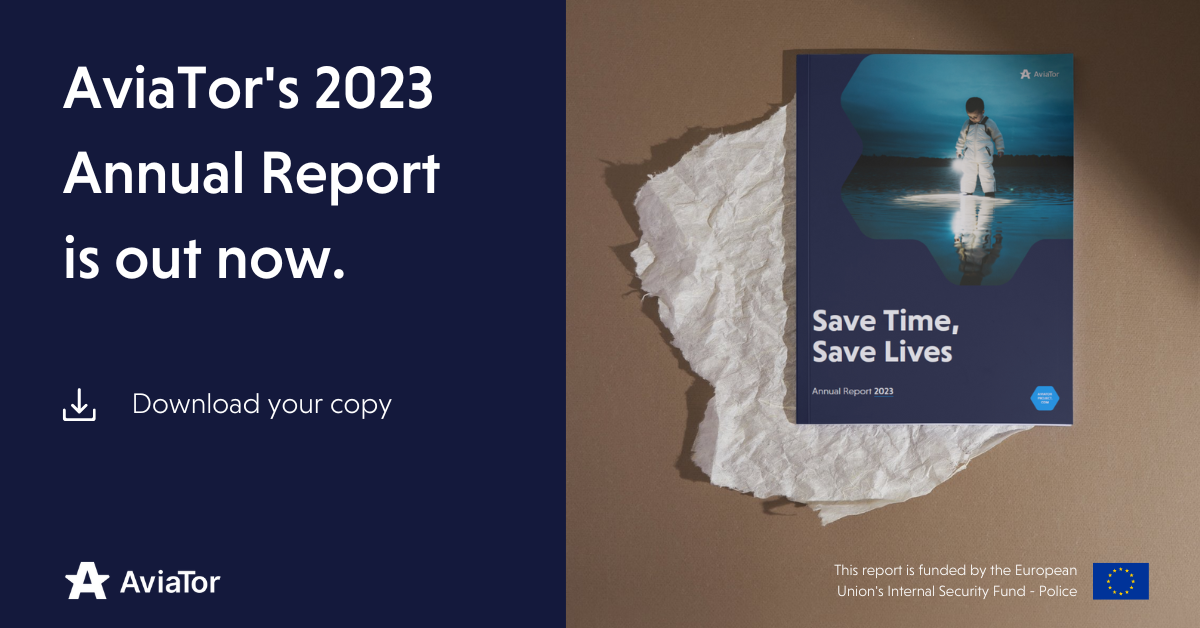AviaTor Articles
AviaTor Annual Report 2023
The third and final AviaTor Annual Report is now available! The report, officially released during the AviaTor Forum in Brussels, takes the reader through the results of the AviaTor project from its launch in 2019 to its completion in 2024.
The AviaTor project team developed an automation tool for law enforcement, this tool supports them in the prioritisation of the NCMEC reports, an ever-increasing challenge to LEAs. This annual report reflects on the goals that were set during the initial conception, while summing up the achievements, successes, and challenges of the project.
We share insights from law enforcement who use the AviaTor tool to learn more about their experience: from initial interest, to onboarding and implementation. As law enforcement work across different jurisdictions, we created a legal checklist to guide law enforcement agencies through the process of using Open-Source Intelligence (OSINT). Read the report to discover the insights gathered from testing federated learning.
An overview of what you will find in the 2023 AviaTor Annual Report:
- Reflections on the Project
The AviaTor Project began in 2019 and as we close the project this year, we take an opportunity to look back and reflect. AviaTor is a database with many technological features involving Artificial Intelligence (AI) and OSINT, these technologies have developed at warp speed during the project - what effect did this have on the development of AviaTor?
- Listening to AviaTor Users
AviaTor was a concept that is now a practical tool being tested or utilised by 20 LEAs worldwide. As a stand-alone tool, AviaTor's 20 users have 20 unique versions of AviaTor. Each user has different needs depending on criteria such as individual scale, budget, bandwidth, and legislative restrictions. How did the AviaTor support team deal with these different needs?
"I love small-scale projects like AviaTor and CPORT because if an issue arises at any point, you can just pick up the phone and call your developers. It’s easy to get in touch with people if you need help. That’s the advantage of a small-scale project"
Yves Goethals, Judicial Commissioner of the Belgian Federal Police in Brussels
-
Obstacles in Becoming an AviaTor User
Interest in the tool was high from the outset, however, the process of incorporating such a tool into the investigatory process was a long journey. We spoke with Yves Goethals from the Belgian Federal Police in Brussels and Darren Young from the Metropolitan Police in London about their experiences and the obstacles they had to overcome in becoming an AviaTor user.
-
Legal Checklist
OSINT is publicly available information, however, if law enforcement wants to utilise OSINT in their investigations they do need to keep in mind national legislation and limitations and constraints are in place. Timelex, AviaTor's legal partner, put together a legal checklist for LEAs to use.
-
Testing Federated Learning
AviaTor employs AI methods to detect relevant content that could help law enforcement with their investigations. Part of the project therefore had to focus on the high-quality data required to train the AI model, which was achieved with support from the Dutch hotline Offlimits and Belgian hotline Child Focus. Both hotlines manually annotated thousands of images for this purpose, learn more about the results.
-
The Way Forward
The development of AviaTor would not have been possible without the funding provided by the European Union's Internal Security Fund - Police. However, its continued development is now up for discussion as the project comes to an end. What are the plans for the sustainability of AviaTor in the future?
Get your digital copy of the 2023 AviaTor Annual Report here .
